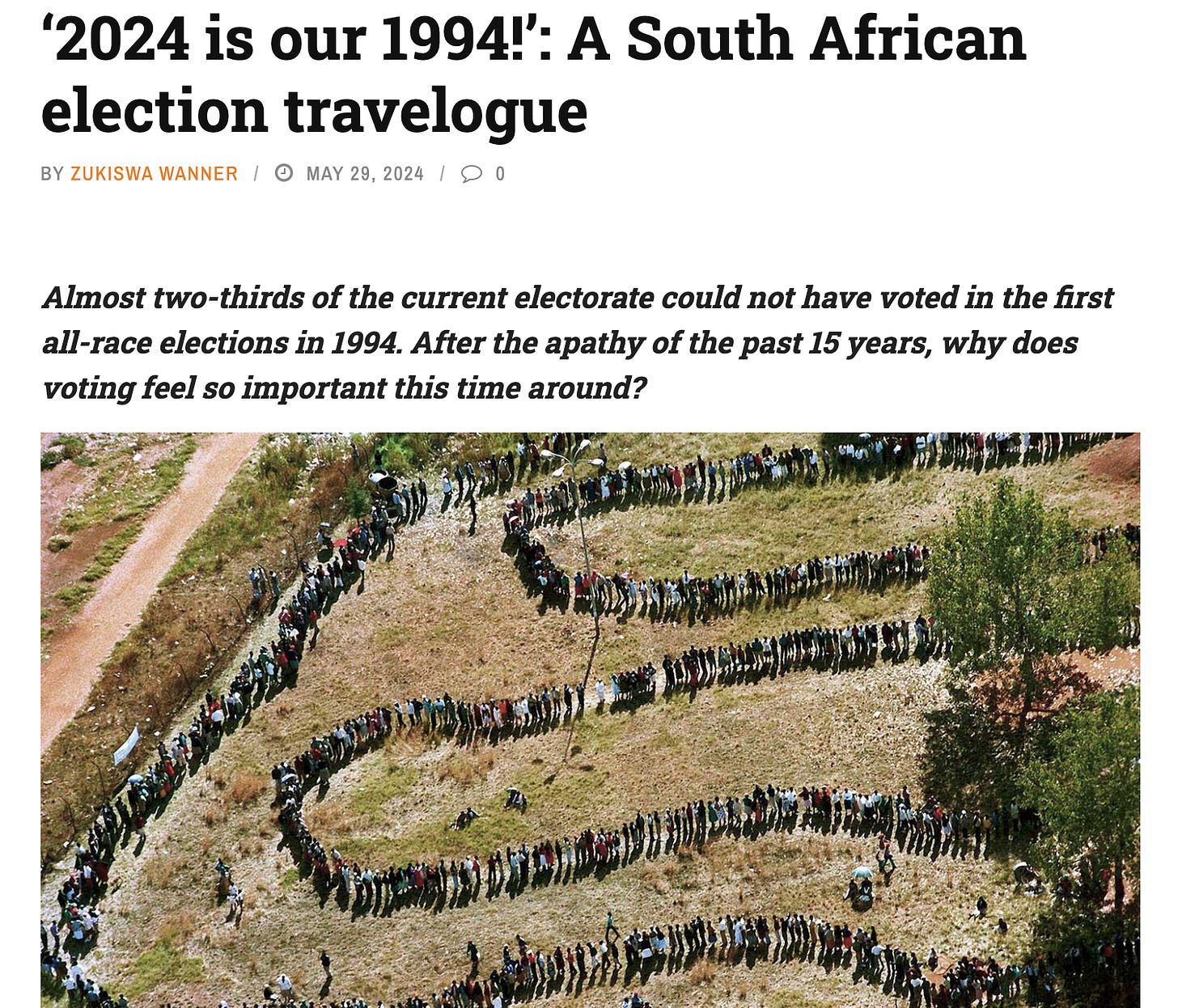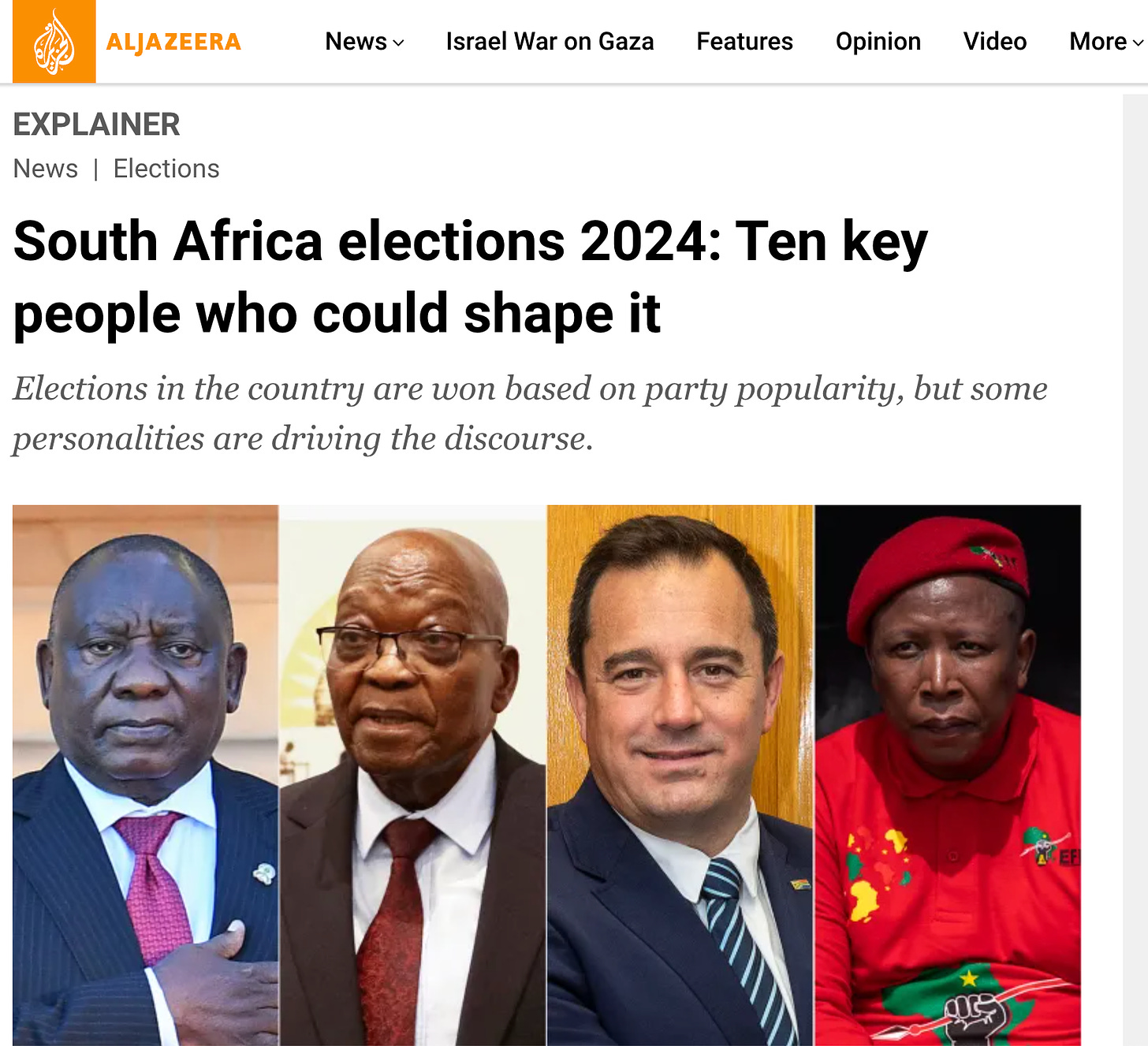South Africans go to the polls today to vote in National and Provincial elections. Polls suggest that the governing ANC is at risk of securing less than 50 percent of the vote, losing its parliamentary majority and being forced to create a coalition government. 33 percent of South Africans are uncommitted. The party has won all six general elections since the transition to democracy in 1994, but the party’s popularity has hit a record low. John Eligon outlines what to know.
What is at stake
Alexis Akwagyiram explains that most South Africans want change, but cannot agree on the kind of change needed, and who should lead. Whatever happens, Ivor Chipkin suggests that major change is underway. Salih Noor describes this as political change and democratic uncertainty. Zukiswa Wanner provides this campaign travelogue.
Here is an overview of the leading campaigns. The Crisis Group outlines what is at stake. These eight charts explain the issues. Dan De Kadt outlines what is different this time around, and explains some important facts about South Africa’s electoral system. The Resistance Bureau has this nice discussion.
These are some great photos from the campaign trail.
The playing field
Cyril Ramaphosa is the incumbent, and leads the ANC. His role in the Marikana massacre stays with him. Read this excellent article to learn more about the political legacy of the massacre, and how it led to losses for the ANC.
Jacob Zuma is back. He is the leader for the new uMkhonto weSizwe (MK) party, which is especially powerful in KwaZulu Natal. There is infighting that undermines it strengths. While Zuma cannot run in the election, he looms large as a kingmaker as Sisonke Msimang argues.
John Steenhuisen leads the center-right Democratic Alliance (DA), which has been unable to shed its perception as a “white party.” Their slogan claims that “A strong DA can rescue SA.”
Radical leftist party the Economic Freedom Fighters (EFF) leads populist-turned-established politician Julius Malema. The party is popular, but has been unable to attract more than ten percent of the vote, and might have reached its peak.
Former Johannesburg mayor Herman Mashaba has used anti-immigrant sentiment to strengthen his campaign. He oversaw police raids on foreign-owned shops during his time as mayor, and is a leader of xenophobic nationalism in the country.
Zackie Achmat seeks to change the country from within Parliament. Songezo Zebo leads the RiseMzansi party, advocating for centre-left economic reforms.
These ten people could shape the outcome.
The legacy of Apartheid
South Africa recently celebrated 30 years of democratic rule. There is a lot to celebrate: A free and independent press, a durable and progressive constitution, and a booming commercial life for the middle class. This is a nice retrospective of how the country has fared on the country’s ten principles of the Freedom Charter. There are signs of economic hope.
But there is also a ton of disappointment. Corrupt politicians continue to fill the lists of the ANC and the lack of economic redistribution illustrates the persistence of systematic inequalities. Many young South Africans are rethinking Nelson Mandela’s legacy. The country remains deeply segregated and highly unequal, and many black residents blame the ANC for breaking promises of a better life. Urban design keeps the country segregated.
Chris Ogunmodede explains how the past thirty years offers important lessons in myth-making and storytelling. Evan Lieberman offers his take. This set of historians provide these excellent insights into South African democracy at 30.
South Africa’s inability to overcome the legacy of Apartheid is front and center on the minds of the citizenry as they head to the polls. The country’s 33% percent employment rate, which is higher for the black population, looms large. High crime and corruption remain big problems. Poor electricity and clean water access undermine livelihoods. Ordinary South Africans still demand land reform, as Michael Albertus discusses here.
The end of one-party rule?
The election could signal the end of one-party dominance in South Africa. Clearly, the ANC is a party in decline as corruption, infighting, and broken promises undermine its ability to govern effectively and justly. This is where the ANC went wrong.
Only 4.4 million from the ages of 20-29 have registered to vote, out of 11 million eligible. Carolyn Holmes explains how many young people might sit out the election. A big question remains whether young people will voice these frustrations at the polls. William Shoki explains the disengagement from politics that has contributed to the rise of identity as the mobilizing force in the country.
Despite all this, South Africa is still ANC country. As 23-year-old Shaylin Davids bluntly told the NY Times: “I don’t want to vote because my vote isn’t going to count. At the end of the day, the ruling party is still going to be A.N.C. There’s still no change.”
Sociologist Roger Southall explains: “We are in a sort of dead-end situation. [The A.N.C. may cling to power] but they don’t have the capacity or the ideas to govern.”
Political betrayal
South Africans are disillusioned and disappointed. But the situation is more than just about disillusioned youth. South Africans also feel betrayed by the ANC they fought so hard with to overcome white minority rule. I call this political sting.
Marcel Paret’s excellent Fractured Militancy explains how feelings of betrayal and resentment underpin the consistent surge of local protests in the country. These emotions might fuel political change at the ballot box. Zachary Levenson’s Delivery as Dispossession and Nicholas Rush Smith’s Contradictions of Democracy explain how failures of service delivery and criminal justice are experienced at the local level, leading to a surge of collective action that sometimes becomes violent. Kerry Ryan Chance outlines how activists attempt to overcome the criminalization of popular politics in Living Politics, and Anne-Maria Makholu’s Making Freedom explores how ordinary South Africans make claims on the state and the cities in which they live, becoming part of history in the process.
These important studies demonstrate how many South Africans feel left behind by government policies and the forces of history. But they also center them as active participants in creating a new form of politics. These emerging politics are happening in the very neighborhoods where ordinary people live.
This election is a formal marker for how much more work there is to be done, and what electoral path the country is on toward responding to the needs and desires of people on the ground.
Politics of immigration
Immigration is a key issue in this year’s election. The country is home to an estimated 4 million immigrants, and some politicians and government officials blame them for crime and taking jobs. Shelley Liu explains that misinformation is a big problem, much of which is spread on apps like WhatsApp. Beth Wellman provides this overview of the role immigration is playing in the electoral contest. Loren Landau’s Exorcising the Demons Within is a great analysis of xenophobia in the country.
There are other implications as well. There could be a shift in foreign policy. Justice Malala argues that there is likely to be massive reshuffling in the government after the polls. And Benjamin Fogel explains how the political disintegration in South Africa offers a glimpse into how Western democracies could fail.
Stay tuned.







I love SA. Watching closely.
*33% unemployment rate?